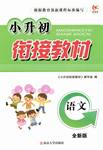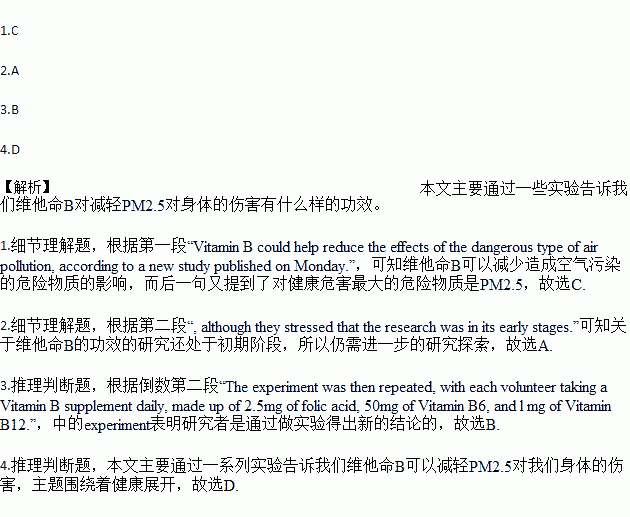题目内容
Vitamin B could help reduce the effects of the dangerous type of air pollution, according to a new study published on Monday. In the first study of its kind, a team of international researchers looked into the damage caused by one of the pollutants that have the severest impact on health—PM2.5.
They found that Vitamin B supplement could effectively reduce the impact of the tiny particles (颗粒)on the human body, although they stressed that the research was in its early stages. According to the WHO, 92% of the world's people are living in places where the PM2.5 level goes beyond the recommended level. So it’s urgent to find a solution to the problem.
According to this study, published in the PNAS, 10 volunteers were initially exposed to clean air and given a placebo (安慰剂)to check their baseline responses. The group then kept on taking placebos tor tour weeks before being exposed to heavily polluted air from downtown Toronto, where an estimated 1,000 cars passed every hour. The bad air was delivered to the volunteers through an "oxygen type" face mask. The experiment was then repeated, with each volunteer taking a Vitamin B supplement daily, made up of 2.5mg of folic acid, 50mg of Vitamin B6, and l mg of Vitamin B12.
Vitamin B6 can be found in liver, chicken, nuts and other things, and Vitamin B12 in fish, meat, eggs, milk and some cereals. The researchers found that four weeks of Vitamin B supplements — the damage of PM2.5 effects by 28-76%. The results emphasized how prevention at an individual level could be used to fight against the damage of PM2.5, the researchers said.
1.What's the newly discovered effect of Vitamin B in Paragraph 1?
A. It can be used to replace other vitamins in our daily life.
B. It can help lower the air pollution level in the open air.
C. It can reduce the impact of PM2.5 on human bodies.
D. It can get rid of the pollutants remaining in our body.
2.What can be learned from the second paragraph?
A. Further study about the effect of Vitamin B needs to be done.
B. Vitamin B is the most important to human's health.
C. The tiny particles in the air are made up of PM2.5.
D. 92% of the world's people are affected by PM2.5.
3.How did researchers draw the new conclusion about Vitamin B?
A. By referring to a journal. B. By performing experiments.
C. By interviewing scientists. D. By comparing vitamins.
4.You may read the passage on a website about .
A. environment B. medicine
C. education D. health
 学而优衔接教材南京大学出版社系列答案
学而优衔接教材南京大学出版社系列答案 小学课堂作业系列答案
小学课堂作业系列答案

 C. fortunately D. actually
C. fortunately D. actually